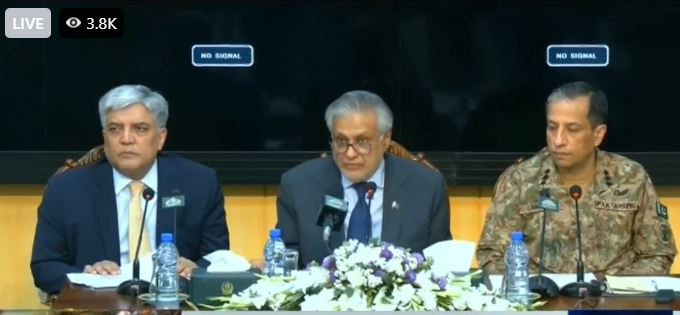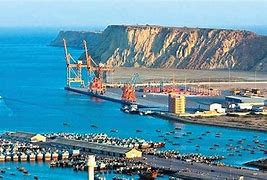ISLAMABAD – Deputy Prime Minister and Foreign Minister Senator Ishaq Dar and Director General ISPR Lieutenant General Ahmed Sharif Chaudhry addressed a joint press conference at the Ministry of Foreign Affairs in Islamabad.
The press conference comes in response to what Pakistan has called “unprovoked Indian firing” along the Line of Control (LoC) — a serious escalation that has heightened tensions between the two nuclear-armed neighbours.
During press briefing, Foreign Minister Ishaq Dar condemned India’s provocative actions following the Pahalgam attack, warning that such moves threaten regional stability. He reaffirmed that Pakistan would not initiate conflict but would respond strongly if provoked.
He expressed condolences over the Pahalgam attack, emphasizing that Pakistan, having suffered from terrorism, deeply understands the pain of such incidents.
Deputy PM turned down India’s accusations linking Pakistan to the attack, describing them as part of a recurring strategy to distract from India’s internal issues, particularly in Kashmir. Dar criticized India’s use of fabricated security threats to deflect attention from its human rights violations in occupied Kashmir and its oppression of the Kashmiri people.
Minister also denounced India’s unilateral suspension of the Indus Waters Treaty, calling it a violation of international law. He demanded an independent and transparent investigation into the Pahalgam attack and questioned India’s motives behind the allegations.
He emphasized that Pakistan was committed to peace and would not be the first to escalate the situation. However, he warned that any escalation by India would be met with a strong response. He also reiterated Pakistan’s firm opposition to terrorism in all forms, underscoring that the country had been a victim of cross-border terrorism orchestrated by India for years.
Pakistan’s leadership also questioned India’s sudden and baseless accusations against Pakistan, pointing to the rapidity with which Indian authorities assigned blame without providing credible evidence. Lt Gen Chaudhry, in his remarks, raised doubts over the geographical feasibility of the attack being linked to Pakistan, pointing out inconsistencies in India’s narrative and stressing that the attack’s location made it unlikely that Pakistan was involved.
ISPR Director General further warned that India was using terrorism to further its political objectives, drawing parallels with previous incidents, such as the 2019 Pulwama attack, where India had similarly accused Pakistan without evidence. He also stated that Pakistan had credible intelligence suggesting that India was continuing to incite violence through its proxies within Pakistan.
Pakistan’s top security forum, the National Security Committee (NSC), reiterated the country’s commitment to defending its territorial integrity and sovereignty. The government’s resolve is clear: any attempt to undermine Pakistan’s security will be met with decisive and forceful action.
With the region’s stability at risk, both Dar and Chaudhry called on the international community to intervene and hold India accountable for its actions, especially its role in fostering terrorism and undermining regional peace. They also highlighted the growing Islamophobic narrative in India and its dangerous potential to escalate tensions further.
As Pakistan maintains its position of vigilance and restraint, the government remains determined to protect its sovereignty and confront any provocations from India with a united and forceful response.
Related Posts
Pakistan, China reiterate all-weather strategic partnership amid India tensions

















